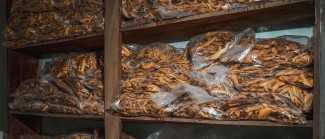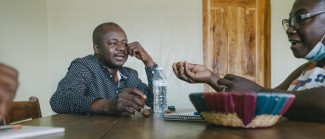Improved infrastructure brings producers and exporters together, raising volumes, incomes and tax revenues as trade recovers from the effects of Covid-19.
Karongi District in the western part of Rwanda hugs Lake Kivu and lies roughly halfway between two major towns, Goma and Bukavu, just across the border in the Democratic Republic of Congo (DRC).
Livestock graze on the steep slopes of the green hills but as most families keep the same or similar types of animals, the real opportunity for residents lies across the border, in DRC, where demand is high.
At some border points, as many as 40,000 people cross daily but this cross-border trade has for long been largely informal, unregulated, and insecure, particularly for female traders.
In 2018 the Government of Rwanda, with support from partners, began building new cross border markets to make it easier for traders to do business across the border. Under the Inclusive Cross Border Trade Capacity Development Project, two modern cross border markets were developed in Karongi on the border with DRC, and in Butera District, bordering Uganda.
The work involved establishing a national cross-border market framework to support the implementation of Rwanda’s cross-border trade strategy to grow two-way trade, and to set up management structures, regulations, operational guidelines and processes.
In addition, market infrastructure to support cross-border trade was upgraded, including by providing sheds with stands for fresh produce, and setting up of livestock yards. Cold rooms were set up to store milk, meat and other perishable commodities, shops and stalls were built to display dry commodities with longer shelf-lives, as were storage warehouses. In addition, transport and logistics contractors were signed up to streamline routes-to-market.
The coronavirus pandemic inevitably disrupted trade, including by causing the closure of the border as governments limited movements to stem the spread of the disease. Plans to build cold-storage facilities at Karongi were put on hold and the warehouses are operating at quarter-capacity. However, positive results are beginning to show as movement restrictions are lifted.
An average of 502 pigs, 270 goats, 283 poultry and 39 sheep are sold every market-day, Friday, in Karongi cross-border market, generating about Rwf75,250,000 (approximately $74,000) in income. There’s also trade in grain and drinks, and there are plans to open the market twice a week soon due to growing demand.
“Cross-border trade stopped for almost two years,” says Peter Donelan, Rwanda country coordinator at the Enhanced Integrated Framework. “Sellers suffered but now that the border is open in 2022, demand is high, and they plan to expand quickly with new market days and more shop leases.”
Before the cross-border market was built, Baziruwiha Bartazar, a trader and a member of the cooperative, sold about 200 pigs every week at the lakefront. Working out of the market, he now sells 450 pigs per week and is planning to increase supply to meet rising demand. As a result of the demand, the price has also almost doubled and pigs that were sold at an average of Rwf80,000 can, in some cases fetch as much as Rwf150,000 each.
The government has also benefitted from this more formalized trade by collecting Rwf3,500,000 in tax each month from Karongi Market. This is bound to rise as trade volumes grow.
There are wider benefits as well. According to UNCTAD, women account for a large percentage of informal cross-border traders and the sector is a vital source of employment and livelihoods for the poor, particularly low-income and low-skilled women in border districts.
Eighty per cent of informal cross-border trade in Rwanda takes place in the western province which also has one of the highest poverty rates in the country. About seven out of every 10 cross-border traders in Rwanda’s western province are female, according to official data. Their income and livelihoods can be improved through their integration into cross-border supply chains, enhancing the scale and quality of their participation in cross-border markets, as well as improving their marketing knowledge, financial literacy and access to finance.
There is strong evidence that cross-border markets have positively impacted livelihoods through enhanced incomes, including among youth and women. This has positively impacted Karongi District, including the economic welfare of the residents.
As pandemic-related restrictions are lifted, attention will now shift to growing trade volumes as well as exploring value-addition to the products sold. Discussions are underway with investors in the capital, Kigali, about taking up shop facilities to sell value-added products across the border.
Despite the effects of COVID-19 and the closure of the border with Uganda which negatively impacted the operations of some of the cross-border markets, the projects will continue to operate even after the EIF program ends.
Discussions with beneficiary traders, representatives of the Private Sector Federation, district officials as well as contracted managers in the cross-border markets reveal a sense of ownership and interest in using and sustaining the new infrastructure to facilitate cross-border trade.
The availability of produce and growth of export markets is boosting the agricultural sector in Rwanda, with exports of agricultural products growing by double digits in the first quarter of the 2021/2022 financial year.
With DRC joining the East African Community, the future of agricultural exports from this corner of Rwanda is as lush as its green hills.
---
This article is part of the EIF Evaluation Series, looking at 10 years of impact from the EIF partnership in least developed countries. Volume 2 of the EIF Evaluation includes a case study of Rwanda. Read more about EIF's interventions in Rwanda on p.116.
If you would like to reuse any material published here, please let us know by sending an email to EIF Communications: eifcommunications@wto.org.



